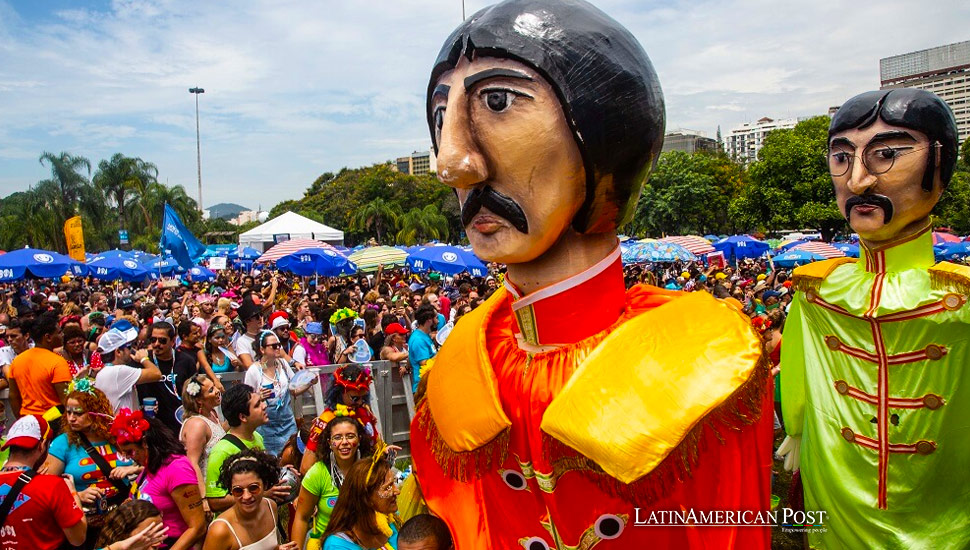Brazil Officially Recognizes Carnival “Blocos” as a Cultural Heritage

Brazilian President Luiz Inácio Lula da Silva has signed a law designating street carnival bands, known as “blocos,” as an integral part of the nation’s cultural heritage, enabling them access to cultural funding.
In a significant move that champions Brazil’s vibrant street carnival culture, President Luiz Inácio Lula da Silva recently sanctioned a bill that acknowledges the country’s carnival ‘blocos’ as a ‘manifestation of national culture.’ This new status not only celebrates these grassroots musical groups but also opens doors for them to secure funding through tax incentives provided to private companies sponsoring cultural activities. This means that companies can now invest in sponsoring ‘blocos’ and receive tax benefits in return, providing a sustainable source of funding for these cultural groups.
Preserving Brazil’s Carnival Heritage
Deputy Maria introduced the legislation, signed in a reserved ceremony by Rosario Nunes of the Workers’ Party (PT)—a party founded and led by Lula in 1980. This law marks a pivotal moment in recognizing and preserving Brazil’s carnival traditions, which have animated the nation’s streets for decades.
In the 19th century, ‘blocos’ were born from the creative spirit of Afro-Brazilians, drawing heavily on African rhythmic traditions that later evolved into samba. Despite facing initial censorship from Rio de Janeiro’s economic and political elite, these street bands persevered, gradually becoming a symbol of community expression in neighborhoods and, eventually, the bustling city center. By the early 20th century, these groups reclaimed their cultural space, gaining popularity and breaking social barriers to include all classes.
Cordão da Bola Preta, established in 1918, was the first ‘bloco’ officially recognized by Rio de Janeiro’s authorities. This ‘bloco’ is known for its vibrant costumes, energetic music, and massive scale, attracting more than a million participants during the carnival. Another example is ‘Monobloco ‘, a ‘bloco’ that blends traditional samba with contemporary music, drawing a diverse crowd of all ages. These examples illustrate the diverse nature of ‘blocos’ and their role in fostering a nationwide carnival culture that precedes the formal parades of samba schools in the iconic Sambódromo, introduced in 1984.
Legislative Recognition and Cultural Preservation
This legislative action comes at a time when cultural expressions worldwide are increasingly recognized for their intrinsic value and potential to foster community identity and cohesion. By officially recognizing ‘blocos’ as an artistic manifestation, the Brazilian government is not just celebrating the past, but also paving the way for a vibrant future. This elevation of the status of ‘blocos’ ensures their sustainability through access to funding, which can be instrumental in nurturing the arts and cultural sectors affected by economic fluctuations.
The law is part of a broader cultural initiative that includes other significant measures, such as establishing work guarantees for museum and library staff and declaring the Vale do Panema region in São Paulo a site of ‘tourist interest’ due to its natural beauty and cultural significance surrounding the Jurumirim hydroelectric dam reservoir. This comprehensive approach to cultural preservation and promotion demonstrates the Brazilian government’s commitment to safeguarding the country’s diverse cultural heritage and ensuring its accessibility to all.
The formal recognition of ‘blocos’ as a vital part of Brazil’s cultural heritage represents a progressive step towards embracing and institutionalizing the diverse cultural landscapes of Latin America. In many Latin American countries, similar grassroots cultural movements are gaining recognition as essential national identity and heritage elements. This trend reflects a growing appreciation of the role that culture plays in development and social integration, as well as the increasing acknowledgment of the rights of communities to celebrate and sustain their unique traditions. This is a moment of collective pride for the entire Latin American community.
Inspiring Cultural Preservation Globally
Moreover, this move could inspire other nations in the region to evaluate and elevate their cultural practices, recognizing them as pivotal to national identity and deserving of protection and promotion. As countries like Brazil take the lead in celebrating and safeguarding their artistic expressions, they set a precedent for how cultural policies can effectively align with broader social and economic objectives, including tourism and international cultural exchange. The formal recognition of ‘blocos’ not only preserves Brazil’s vibrant carnival tradition but also has the potential to boost tourism and stimulate the economy, as it attracts both domestic and international visitors who are interested in experiencing this unique cultural phenomenon.
Also read: Academic Censorship in Brazil is A Covert Attack on Right-Wing Free Speech
By granting ‘blocos’ cultural heritage status, Brazil not only preserves its vibrant carnival tradition but also reinforces the role of culture as a cornerstone of national pride and community solidarity. This legislative act is a testament to the power of cultural recognition in fostering a more inclusive and dynamic society where traditional arts flourish and contribute to the social and economic fabric of the nation. However, the journey towards preserving and promoting ‘blocos’ is not without its challenges. Ensuring the sustainability of these cultural expressions, especially in the face of economic fluctuations and changing cultural trends, will require continued support and investment from both the government and private sector.




